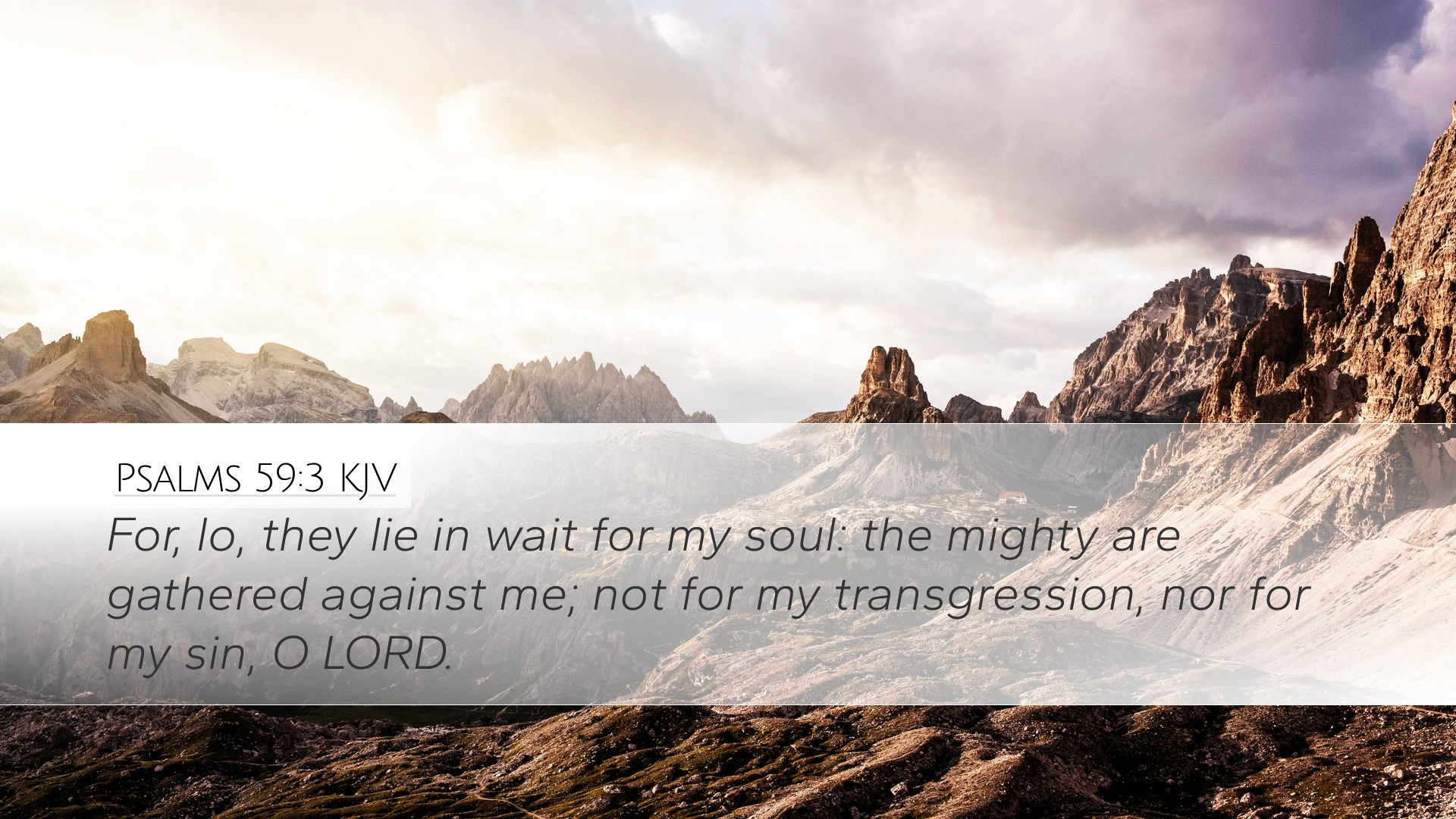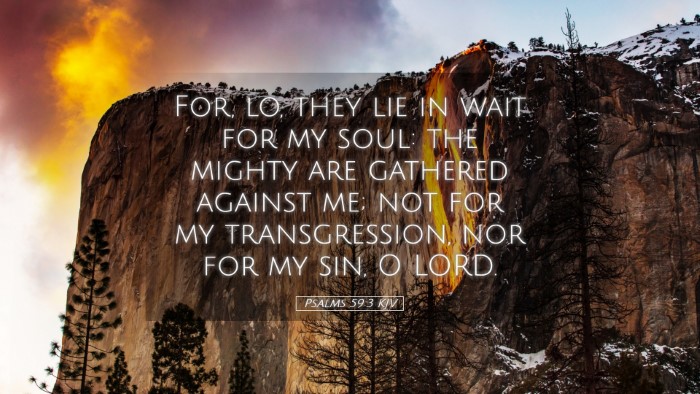Commentary on Psalms 59:3
Verse: Psalms 59:3 - "For, lo, they lie in wait for my soul: the mighty are gathered against me; not for my transgression, nor for my sin, O Lord."
Introduction
The text of Psalms 59:3 draws attention to a profound lament by David, who finds himself surrounded by enemies seeking his demise. This psalm provides a rich avenue for understanding the themes of divine protection, the reality of injustice, and the fervent calls for God’s intervention on behalf of the righteous.
Contextual Background
David composed this psalm during a period of intense persecution, specifically when Saul sent men to kill him. It reflects a deep sense of personal distress amidst external threats, which illustrates the cry of a righteous man under attack.
Matthew Henry’s Commentary
Matthew Henry emphasizes the profound sense of betrayal that David experiences. He notes that the psalmist highlights that those who pursue him are not enemies due to any wrongdoing on his part. Henry illustrates how David's circumstances reflect the suffering that the innocent often endure:
- Divine Justice: Henry points out that David appeals to God's justice, asserting his innocence before the Lord.
- Vigilance of Enemies: The phrase "lie in wait" suggests a premeditated conspiracy against David, which speaks to the insidious nature of treachery.
- Reliance on God: Ultimately, Henry observes that David's lament positions him favorably as one who turns to God for aid, providing a model for the faithful in times of trouble.
Albert Barnes' Commentary
Albert Barnes expands on the imagery in the verse. He emphasizes the gathering of mighty foes as reflective of the powerful forces that often align against those who follow God:
- The Nature of Opposition: Barnes identifies the adversaries as "the mighty," indicating that the opposition David faces is formidable, yet not without its rightful end under divine authority.
- The Emphasis on Innocence: He stresses that David's proclamation of innocence in suffering only highlights the often-unjust nature of persecution in the lives of the righteous.
- Call to the Almighty: Barnes points out that David’s response to his unjust situation is to turn his cry to God, illustrating that seeking divine intervention is both a refuge and a necessity for believers facing trials.
Adam Clarke’s Commentary
Adam Clarke provides an insightful exegesis on the spiritual implications of this text, particularly focusing on the descriptors of the enemies and their motives:
- Spiritual Warfare: Clarke draws parallels between David's plight and the spiritual warfare faced by believers today, portraying the enemies as representative of spiritual forces opposed to God's purpose.
- Understanding Persecution: He argues that David's situation serves as a reminder that persecution can come unjustly, yet God’s ultimate justice prevails.
- The Righteous Stand Firm: Clarke encourages readers to reflect upon their own challenges and to remain steadfast in faith as David did, focusing on God's strength amid adversity.
Theological Implications
This verse fosters a rich discussion on several theological themes:
- God as Refuge: In moments of distress, believers can find solace in knowing that God is a refuge and strength for those who seek Him.
- Innocence and Suffering: David's assertion of his innocence provides a compelling argument against the notion that suffering is always a result of sin, urging believers to trust in God’s justice.
- The Nature of God’s Protection: This psalm reassures the faithful that God promises to be with them even in the face of opposition, thus providing a platform for continued faith and trust in His provision.
Practical Applications
For contemporary application, Psalm 59:3 serves as a powerful reminder:
- Facing Unjust Persecution: Believers are encouraged to articulate their struggles and seek divine intervention when facing adversity, remaining steadfast in faith during trials.
- Building Community Support: This psalm underlines the importance of communal support among believers, as understanding and empathy can uplift those under persecution.
- Prayer as a Response: Inspired by David's example, pastors and leaders are reminded to encourage congregants to turn to prayer as the first line of defense in crises.
Conclusion
Psalms 59:3 invites readers to address the complexities of faith amid trials characterized by betrayal and persecution. By combining insights from various public domain commentaries, this analysis underscores the necessity of placing complete trust in God, maintaining hope for justice, and relying upon His strength in our own moments of distress.


